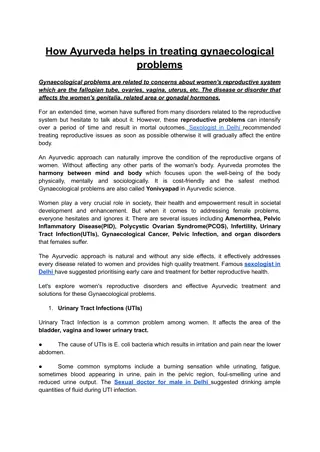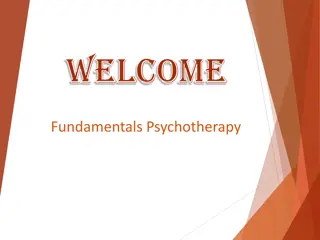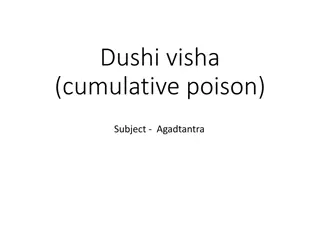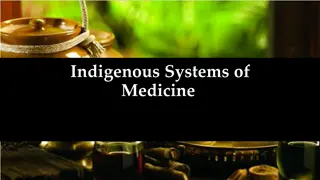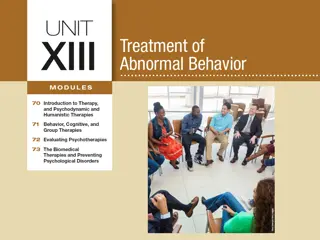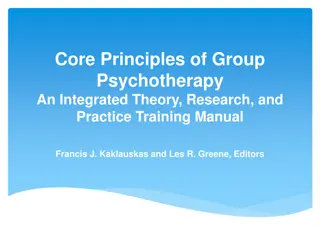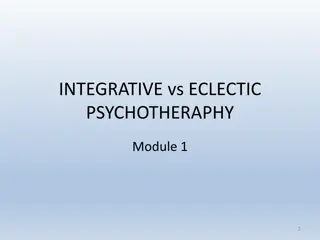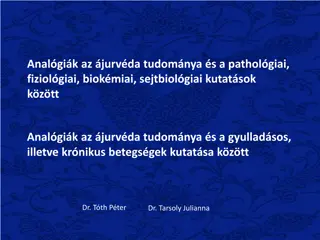Understanding Ayurveda and Psychotherapy for Mental Health
Ayurveda, the Science of Life, offers a holistic approach to health encompassing physical, mental, and spiritual well-being. It emphasizes three treatment modalities, including psychotherapy. Psychotherapy, a key element in modern mental health, involves the treatment of emotional issues to promote positive growth. Understanding the connection between Ayurveda and psychotherapy can enhance mental health care by addressing behaviors, emotions, and thoughts contributing to mental disorders.
Download Presentation

Please find below an Image/Link to download the presentation.
The content on the website is provided AS IS for your information and personal use only. It may not be sold, licensed, or shared on other websites without obtaining consent from the author. Download presentation by click this link. If you encounter any issues during the download, it is possible that the publisher has removed the file from their server.
E N D
Presentation Transcript
Dr. Nitin Pandey Dept. Of Kayachikitsa
INTRODUCTION Ayurveda is regarded as The Science of Life and the practice involve the care of physical, mental and spiritual health of human being. Life according to Ayurveda is a combination of senses, mind, body and soul. Ayurveda is not only limited to body or physical symptoms but also give comprehensive knowledge about spiritual, mental and social health. Thus, Ayurveda is a qualitative, holistic science of health and longevity, a philosophy and system of healing the whole person, body and mind Ayurveda emphasizes its treatment modalities into three parts viz. Satwawajay Chikitsa, Yuktivyapashray and Daivyapashray Chikitsa. Sattvavajaya therapy mentioned in Charakasamhita and it used as new concept of psychotherapy Yuktivyapashraya is rational therapy and Daivyapashray is faith therapy. in Ayurveda. Whereas contd............
Cont............. Life has been described as the complex combination of Body (Sarira), Senses (Indriyas), Mind (Sattva) and Soul (Atma). Anything that interferes with life (Ayu) can have an access to any one of these four and hence the treatment differs accordingly. Treatment of the disorders of Mind (Sattva) is known as psychotherapy. The term mental disease (Manasika Roga) is not restricted to mean insanity and allied conditions of specific mental derangement, but also includes to some extent the emotional disorders. The emotional factors, when cross the state of normalcy and get deranged, become the syndromes or mental disorders. Mental disease have been described separately and they have been further classified into Rajas and Tamas groups. The importance of examination of Sattva is stressed as the determination of psychic personality (Manas Prakrti) is essential to the treatment of the patient.
PSYCHOTHERAPY In modern, mental-health, psychotherapy is defined as the treatment by psychological means, of problems of an emotional nature in which a trained person deliberately establishes a professional relationship with the patient with the object of- removing and modifying or retarding existing symptoms of mediating disturbed pattern of behavior of promoting positive personality growth and development Psychotherapy is use of psychological technique in the treatment of mental of mental disorder or maladjustment. This technique should be strictly reserved for treatment by a professional trained person, i.e., clinical psychologist, psychiatrist and a psychiatric social worker. It has three main varieties viz supportive, re-educative and reconstructive.
How Does Psychotherapy Help? Psychotherapy helps people with a mental disorder to: Understand the behaviors, emotions, and ideas that contribute to his or her illness and learn how to modify them Understand and identify the life problems or events -- like a major illness, a death in the family, a loss of a job, or a divorce -- that contribute to his or her illness and help him/her understand which aspects of those problems he/she may be able to solve or improve Regain a sense of control and pleasure in life Learn healthy coping techniques and problem-solving skills
PSYCHIATRY AYURVEDIC VIEW The mind or manas is considered three dimensional in terms of three gunas viz. sattva, rajas and tamas. The raja represents activity and dynamism while the tamas denotes inertia and darkness. Sattva is the state of pure mind with absolute balance when both the extreme qualities of mind viz. rajas and tamas cease or merge in each other. It is believed that all mental illness are because of the disorders of rajas and tamas. Sattva is never the cause of illness. This is why rajas and tamas are also called manas doshas. In consideration of the trigunas, Ayurvedic puts forward that there can be three broad categories of mental personalities or prakritis viz. sattvik prakriti, rajasik prakriti and tamasik prakritis. These three on the basis of finer consideration are further divided into 16 manas prakritis or mental traits. These 16 personality traits are characterized with unique features, which may also predispose specific mental diseases simulating 16 personality factors of modern psychology. Cont.........
Contd............... Mind exerts a special effect on the Metabolism of the Body. Ayurveda regards three metabolic elements present in our body. These are called Vata, Pitta and Kapha. They are nothing but the Biological representatives of the five basic proto-elements, in the Body. These three are responsible for normal physiological functions or pathological Disorders. Their Balanced state results in normal Healthy Life while their physiological Imbalance is responsible for Body Metabolism. Similarly the disturbed Mental States also disturb the balance of these three Biological elements, which in turn cause Body Disorders. Hence Disorders emerges as results of vitiation of both the body and the Mind. Thus interaction of Body and Mind is well thought of inAyurveda. An over all view of the total Ayurvedic literature available in the context of ancient psychiatry would reveal that Ayurveda describes in detail all possible clinical entities of psychiatric illness as comparable to the contemporary sciences. The common psychiatric diseases described in Ayurveda are different kinds of unmade (psychosis), apasmara (convulsive disorders), chittodvega (anxiety disorders), chittavasada (depressive illness), mada (alcoholism and drug abuse),murcchha, smanyasa(condition associated unconsciousness).
PSYCHOTHERAPEUTIC MEASURES IN AYURVEDA The importance of examination of Sattva is stressed as the determination of psychic personality (Manas Prakrti) is essential to the treatment of the patient. The examination of emotional factors (Manasika Bhavas) and the importance of mental characteristics for determining the prognosis of the diseases have been vividly described inAyurveda. The description of all these factors related to mind and psychiatry clearly indicates that in general the method of treatment of psychiatric disorders in Ayurveda is based on some firm fundamental postulates. The method of treatment in Ayurveda as a whole has been classified into three categories by Caraka- Daivavyapasrya Faith therapy Yukti Vyapasrya Rational therapy Sattvavajaya Psycho therapy
Daivavyapasraya Cikitsa It is a sort of faith treatment, derived mainly from Ayurveda. e.g. chanting hymns (Mantra) etc. Daiva essentially refers to the acts of past life. Daiva Vyapasraya Cikitsa is designed to exhaust evil acts of past and thus to combat that Daivakrt diseases. Yuktivyapasraya Cikitsa Here the treatment is based on reasoning and necessary planning and hence is scientific / rational. Causes of the diseases are reasoned out and suitable ways and means are devised to effect the cure, based on fundamental principles of Ayurveda viz. Panca Mahabhuta, Tridosa, Samanya Visesa etc. Pathogenesis is eliminated by the administration of appropriate medicines and by prescribing suitable diets. This treatment is further subdivided into three groups viz., 1. Antahparimarjana (Int. treatment) 2. Bahihparimarjana (Ext. treatment) 3. Sastrapranidhaana (Operative treatment) Antahparimarjana includes both Samsamana and Samsodhan
Sattvavajaya Chikitsa (psychotherapy) Satvavajaya or Psychotherapy is one of the three principal categories of the approach to the patients care as described in Ayurvedic classics. In principle, Satvavajaya is applicable in varying forms in all kinds of diseases, but it is essentially indicated in mental diseases. Sattvavajaya as psychotherapy, is the mental restraint, or a mind control as referred by Caraka, is achieved through spiritual knowledge, philosophy, fortitude, remembrance and concentration . According to Ayurveda, volitional transgression (prajnaparadha) is the main etiopathological factor in mental illness, and can be corrected through psychotherapy or sattavavajaya. Sattvavajaya is that method of treatment through which one tries to bring the intellect (dhi), fortitude (dhrti) and memory (smrti) of the patient into a proper condition. Two methods of sattvavajaya: (1) Assurance to the patient of the return of lost objects or persons. (2) Inducement of emotions opposite to those associated with patient's distress.
Sattvavajaya warrants physician's interference with patient's mind control. This can be achieved by various ways- (1) By regulating the thought process (Cintya), (2) By replacing the ideas (Vicarya), (3) By channelling the presumptions (Uhya), (4) By polishing the objectives (Dhyeya), (5) By proper guidance and advice (Samkalpa) for taking right decisions. Sattvavajaya is that typical Ayurvedic approach which is not only prevents the impairment of intellect, patience of memory, but also brings them back to a normal state, whenever they are impaired. In this therapy, there are some methods, which also include like gradual withdrawal bad habits, addiction, by adopting some good things in behaviors. Replacement of emotions such as malice by love, anger by composure, greed by content, ignorance by knowledge, jealousy by affection, fear by valor, etc., by keeping Mental equanimity such as fortitude, patience, cognizance, remembrance, true knowledge etc Thus, Sattvavajaya plays a significant role in the maintenance of a harmonious state between these three important factors intellect, memory and patience, ultimately leading to a happy healthy state of the individual.
AREAS OF SATTVAVAJAYA CHIKITSA Assurance Replacement of emotions Regulation of thought process Re-framing of Ideas Channeling of Presumptions Correction of objectives and ideals. Proper guidance and advice for taking right decisions Proper control of patience
OTHER MODALITIES OF PSYCHOTHERAPY While describing the principles of treatment of mental diseases Caraka prescribes the following methods of treatment- Jnana - Insight oriented approach Vijnana - Educative approach Dhairya - Supportive approach Smriti - Cognitive approach Samadhi - Psycho-philosophical approach In another reference Caraka mentions a few more methods of treatment- Trivarga Anvesana - To repeatedly recollect and attend to the course of conduct related to the objectives of life (Dharma [virtue], Artha [wealth/prosperity] and Kama [desire]). A person should strive to discard the harmful and unwholesome regimens and adopt the wholesome regimens in regard to the above objectives of life Tadvaidyaseva To render service by those who are well versed in nature and managing any type of mental or psychological diseases
Contd........... Atma Desa Kala Bala Sakti Jnana - To obtain all round basic knowledge of Atma (self), Desa (region), Kula (family), Kala (season), Bala (physic and psychic strength), and Shakti (capacity) of an individual. In Caraka Sutra chapter 8, Caraka describes a few more principles of treatment of mental diseases Besides the above methods of the treatment, stress has also been laid on the avoidance of intellectual blasphemy (volitional transgression i.e. Prajnaparadha) Asatmyendriyartha samyoga (unwholesome contacts of the sense organs with their objects), observance of the code of right conduct (Sadvrtta) and retention of natural urges related to mind (Dharaniya manasika vegas)






